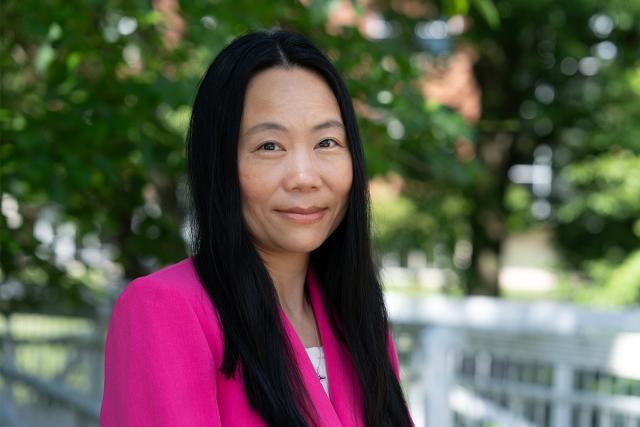Q&A: Jennifer Chen, Ed.D., on Educating Young Children in an AI-Driven World

Kean University Professor and Chair of the Department of Early Childhood Education Jennifer Chen, Ed.D., conducts research on AI in early childhood education, especially its impact on children's learning and development. Chen, who was recently named among the most-cited researchers in the world in the 2023 Stanford/Elsevier ranking, spoke with Kean News about AI, its growing presence, and its impact on the education of children up to age 8.
Q. Can you speak broadly about AI in early childhood education? Is it already in use?
Today’s children are growing up in an increasingly AI-driven world. AI tools are already present in their environments, in things such as smart toys and personal assistant devices; in public spaces; in the home and even at school. More likely than not, we’re all using AI, and sometimes we’re not even aware we’re using it. It’s only natural that we incorporate it and understand how we can better leverage these technologies to serve children’s educational needs.
My youngest daughter is among those children who are growing up in this AI world. At the age of 6, she started playing child-friendly educational video games. One day, I asked who she was playing with, and she said, “No one. I’m playing with AI.” She recognized there were different levels of skill in the game, and she was determined to learn to beat the master. The motivation to learn was from her own curiosity, without being prompted.
Q. What issues do you believe should be addressed?
There are several issues that must be addressed by stakeholders, especially teachers, education leaders and parents. First, there’s a continuous need for educators to learn to leverage AI tools ethically, appropriately and effectively. Teachers need professional development to acquire AI literacy so they can better support children’s understanding. Second, there exists the AI divide. When we think of the prevalence of AI, we think of those families and schools that have the means to purchase AI tools for children to use. Inaccessibility to learning through AI may contribute to inequitable education. And third, while scientific development of AI is progressing really rapidly, society has not kept up in fully understanding and applying AI tools ethically. Some ethical concerns are data use and collection, health and mental health issues, and inappropriate responses from AI to children's questions.
Q. Can we predict the impact of AI on early childhood education?
We can attempt to predict based on our current knowledge, but recognize that there are many variables, including the evolving nature of AI technologies and tools, the diverse developmental characteristics of young learners we're working with, and the AI dispositions of education leaders, teachers and policymakers.
Nonetheless, I think we can make some educated guesses based on current research and technological trends. For instance, AI holds potential for benefiting children's learning and development in ways such as personalizing learning; offering language tools that allow practice and immediate feedback; or engaging in interactive play which can help young children enhance their learning. It can also help children who need extra support or allow emerging readers to access AI-interactive books. What is both exciting and challenging about AI in education are the unknowns. It might be that the unknown territories of AI can motivate us to keep pace with AI's evolution and propel our research and educational practices to new heights.
Q. Is there a risk of AI being used as a substitute for human interaction in schools?
There's no way, I think, AI can fully replace the kind of human interaction and connection children receive from a teacher. It can serve as an enhancer, though. I couldn’t imagine that we get to the point where the teacher just says, “OK, interact with AI, let AI be your teacher.” The very reason many teachers are drawn to the profession is their genuine passion for teaching. If they just let children use AI, and the teachers sit back, they lose the sense of the very purpose that called them to the profession.
Q. What do you foresee for AI in the future of early childhood education?
There is no doubt that AI is here to stay. Either we embrace it, or we’ll be left behind. If we choose the latter, to be left behind, by extension we leave the children behind. We need to figure out how to leverage AI tools effectively and ethically; understand their limitations, benefits and pitfalls; and amplify their positive effects on children’s learning and development. We can imagine a future where the educational landscape is transformed to create spaces that foster innovative approaches, using developmentally appropriate teaching practices within an AI-infused environment, where children can naturally learn from and with AI in ethical and responsible manners.
When I think of the future of AI in education, I recall what Yoda, the legendary Star Wars Jedi master said in The Empire Strikes Back: “Difficult to see. Always in motion is the future."